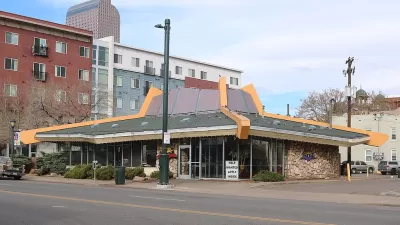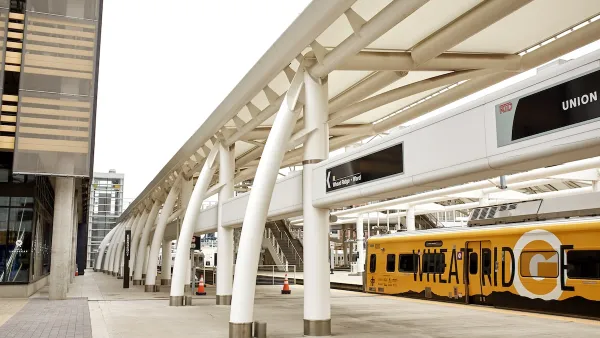Driven by recent controversies over efforts to have historic buildings designated as landmarks over owner objections, the city of Denver is looking at revising its historic-landmark designation ordinance to prevent "real-estate terrorism."
Among the proposed changes [PDF] to
Denver's 2006 historic-landmark designation ordinance, which was passed "to protect
against 'overnight demolitions' by property owners before neighbors
were notified," the most controversial element is a plan to quadruple to $1,000 the fee paid to apply for landmark status over owner objection, reports Colleen O'Connor.
"Supporters argue that higher fees would
prevent abuse of historic-preservation rules by people who want to stop
development," says O'Connor. "Opponents say that doubling the current cost of $250 is
enough to ward off hostile applications, but still be affordable to
people in low-income neighborhoods." The standoff has pitted preservationists against property rights advocates.
For City Councilman Charlie Brown, who "had suggested
raising the fee to $2,500 to protect against 'frivolous' applications
he characterized as 'real-estate terrorism,'" the proposed fee hike doesn't go far enough. "'If you want to jump someone else's claim,'
said Brown, using his trademark Old West parlance, 'you should at least
be prepared to have some skin in the game. I love old buildings, but I
love private property rights even more.'"
"In addition to an increased fee, the proposed changes would require the application to be signed by three Denver residents," notes O'Connor.
"We
really want to make sure there is a level of community support to file a
nonowner initiated application, to make sure people are really serious
about it," said Charles Jordy Jr., a general contractor who serves on the Landmark Preservation Commission.
"It's really a balancing act," he said.
"You want to charge a fee that represents some of your costs, but at the
same time if it jumps so dramatically and if it's perceived as some
sort of deterrent, that's not right."
FULL STORY: Denver mulling plan to raise fee to seek landmark status for buildings

Planetizen Federal Action Tracker
A weekly monitor of how Trump’s orders and actions are impacting planners and planning in America.

Chicago’s Ghost Rails
Just beneath the surface of the modern city lie the remnants of its expansive early 20th-century streetcar system.

San Antonio and Austin are Fusing Into one Massive Megaregion
The region spanning the two central Texas cities is growing fast, posing challenges for local infrastructure and water supplies.

Since Zion's Shuttles Went Electric “The Smog is Gone”
Visitors to Zion National Park can enjoy the canyon via the nation’s first fully electric park shuttle system.

Trump Distributing DOT Safety Funds at 1/10 Rate of Biden
Funds for Safe Streets and other transportation safety and equity programs are being held up by administrative reviews and conflicts with the Trump administration’s priorities.

German Cities Subsidize Taxis for Women Amid Wave of Violence
Free or low-cost taxi rides can help women navigate cities more safely, but critics say the programs don't address the root causes of violence against women.
Urban Design for Planners 1: Software Tools
This six-course series explores essential urban design concepts using open source software and equips planners with the tools they need to participate fully in the urban design process.
Planning for Universal Design
Learn the tools for implementing Universal Design in planning regulations.
planning NEXT
Appalachian Highlands Housing Partners
Mpact (founded as Rail~Volution)
City of Camden Redevelopment Agency
City of Astoria
City of Portland
City of Laramie





























